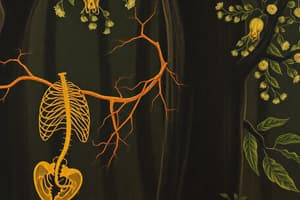Podcast
Questions and Answers
What is the reason behind the sympathetic nervous system being named 'sympathetic'?
What is the reason behind the sympathetic nervous system being named 'sympathetic'?
- Because it consists of two interconnected plexuses
- Because the actions of this system are generally opposite to that of the parasympathetic
- Because the components of this system are not activated all in one time
- Because the components of this system get activated all in one time (correct)
Where do the sympathetic nerves arise from?
Where do the sympathetic nerves arise from?
- Medial horn cells of the thoracic and lumbar segments
- Lateral horn cells of all the thoracic and upper 2 lumbar segments of the spinal cord (correct)
- The cervical and sacral segments of the spinal cord
- The dorsal root ganglia of the spinal cord
Which division of the autonomic nervous system is a local system located in the wall of the alimentary tract?
Which division of the autonomic nervous system is a local system located in the wall of the alimentary tract?
- The lateral horn system
- The sympathetic nervous system
- The parasympathetic nervous system
- The enteric nervous system (correct)
What are the components of the enteric nervous system?
What are the components of the enteric nervous system?
How are the functions of the three autonomic nervous system systems integrated and coordinated?
How are the functions of the three autonomic nervous system systems integrated and coordinated?
What is the effect of sympathetic nervous system activity on the eye?
What is the effect of sympathetic nervous system activity on the eye?
How does sympathetic nervous system activity affect the heart and lungs?
How does sympathetic nervous system activity affect the heart and lungs?
What effect does sympathetic nervous system activity have on the gastrointestinal tract (GIT)?
What effect does sympathetic nervous system activity have on the gastrointestinal tract (GIT)?
What is the effect of sympathetic nervous system activity on the liver?
What is the effect of sympathetic nervous system activity on the liver?
What happens to the urinary bladder due to sympathetic nervous system activity?
What happens to the urinary bladder due to sympathetic nervous system activity?
Flashcards are hidden until you start studying
Study Notes
Sympathetic Nervous System
- Named 'sympathetic' due to its role in preparing the body for stress-related activities, often associated with flight-or-fight responses.
- Sympathetic nerves primarily arise from the thoracic and lumbar sections of the spinal cord (T1-L2).
Autonomic Nervous System Divisions
- The enteric nervous system is a local system located within the wall of the alimentary tract, often referred to as the "second brain."
Components of the Enteric Nervous System
- Composed of two primary plexuses: the myenteric plexus, which regulates gastrointestinal motility, and the submucosal plexus, which controls secretions and blood flow.
Integration and Coordination of Autonomic Functions
- The autonomic nervous system integrates inputs from various sources, including the central nervous system, to ensure coordinated responses among its divisions: sympathetic, parasympathetic, and enteric.
Effects of Sympathetic Nervous System Activity on Eye
- Sympathetic activity leads to dilation of the pupils (mydriasis) to enhance vision in low light conditions.
Effects on Heart and Lungs
- Increases heart rate and force of contraction, enhancing cardiac output.
- Dilates bronchioles in the lungs, allowing increased airflow for better oxygenation.
Effects on Gastrointestinal Tract
- Lowers activity of the gastrointestinal tract, reducing digestive processes during stress responses.
Effects on the Liver
- Stimulates glycogenolysis and gluconeogenesis in the liver, increasing glucose availability for energy during stressful situations.
Effects on Urinary Bladder
- Causes relaxation of the bladder wall and contraction of the sphincters, inhibiting urination during times of stress.
Studying That Suits You
Use AI to generate personalized quizzes and flashcards to suit your learning preferences.



